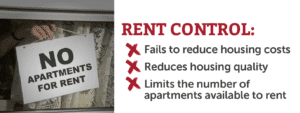
An excerpt from a flyer the Greater Boston Real Estate Board is mailing to Boston residents. Image courtesy of GBREB
The oldest real estate trade organization in Boston has mobilized against Boston Mayor Michelle Wu’s proposal to cap the rate of rent increases in the city.
The Greater Boston Real Estate Board announced Tuesday that it has launched a $400,000 campaign to target city voters with digital ads and print mailers. The Boston Globe first reported the campaign.
“When you look at the last election in 2021, less than 30 percent of the people voted,” said GBREB CEO Greg Vasi. “We need to make sure that people understand all the policies that are going on and this is a perfect example.”
A version of the fliers that will be mailed out to city voters that was shared with Banker & Tradesman focuses on three main messages. It claims rent control “fails to reduce housing costs,” “reduces housing quality” and “limits the number of apartments available to rent.”
It also repeats concerns developers have raised as the outlines of Wu’s proposal leaked to the press that any rent control measure would cause investors to reduce the pace at which housing is built in Boston at a time when many people, including Wu herself, argue that the city desperately needs more housing units.
“We need to take drastic action to house people in this state and rent control isn’t going to help,” Vasil said.
The flyer also contains a QR code that directs recipients to a website for more information on GBREB’s opposition to the mayor’s proposal.
The Boston City Council holds its first hearing on Wu’s proposal tomorrow. The measure, which must first clear the council and then pass Beacon Hill as a home rule petition, would prevent landlords from raising rents more than 6 percent per year, with an additional allowance for increases based on the area consumer price index, for an overall cap of 10 percent per year in rent increases. Buildings will be exempt for the first 15 years of their lifespans.
Wu has argued that the measure will function as a circuit-breaker, preventing “destabilizing” increases that cause renters to move. In an interview with GBH News last month, she claimed that her plan’s cap would be in line with typical rent increases assumed by banks financing new development.
“We’ve done our own research. We’ve done reports. We’ve done a year of digging in. We’ve looked at the comps of different real estate proposals. Most financial institutions, when they give the finances to help build new rental buildings, the estimates they have as to what revenues are going to be and all that they’re not projecting 5-7 percent rent increases anyway,” Wu told “Boston Public Radio” host Jim Braude.
In a statement issued by the mayor’s office following GBREB’s announcement, Wu argued the rent control plan was a necessity to prevent the city’s families from being further destabilized by big jumps in rent.
“We have an urgent housing crisis that is forcing families out of Boston and uprooting children from their schools. This rent stabilization proposal will protect renters from extreme and unaffordable rent increases that are displacing families from our neighborhoods and keep people in their homes. We fully stand behind this proposal and will fight against special interests benefiting from a broken status quo,” Wu said.
But the real estate industry is up in arms over the concept, Vasil said.
“We’ve been told by a lot of our members that they’re not going to put capital at risk in the city of Boston,” he said.
Vasil said he’s worried Boston city councilors will ratchet down the percentage growth in allowable rent increases before the home rule petition goes to Beacon Hill, or that the body likely charged with implementing, monitoring or adjusting any rent control measure could do the same in years to come.
“No matter what happens with this, the administration has put a real chill in the real estate world,” he said.
The mayor’s proposal faces an uncertain future. Some members of the City Council are opposed to it, arguing it does too little to protect renters, and Beacon Hill has historically been cool towards the concept of rent control. But Wu ally and former East Boston city councilor Sen. Lydia Edwards was recently named the co-chair of the state legislature’s Joint Committee on Housing, and Gov. Maura Healey has signaled openness to proposals like Wu’s, so long as they are brought on a municipality-by-municipality basis and do not apply to the whole state.
It’s the chance other cities and towns could pick up Wu’s idea that has Vasil and other real estate leaders worried.
“If something like this passes in Boston, it could clearly spread to Cambridge, Somerville, elsewhere. So, we’ve built a campaign that can scale,” he said.
“Towns will figure out that [rent control] will be a shield, a real deterrent to bring developers into the community,” he added.
This story has been updated with comment from GBREB CEO Greg Vasil.




 |
| 

